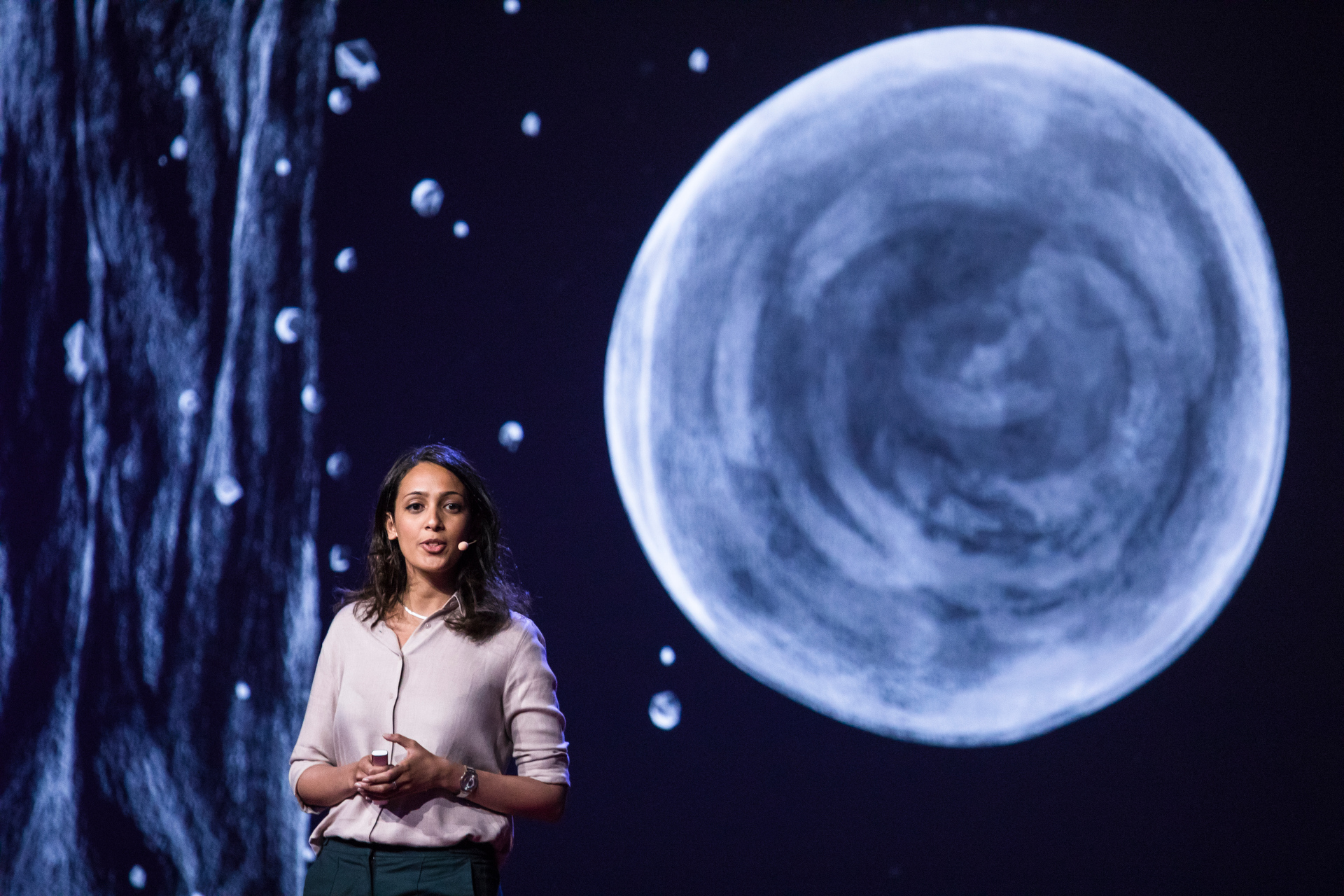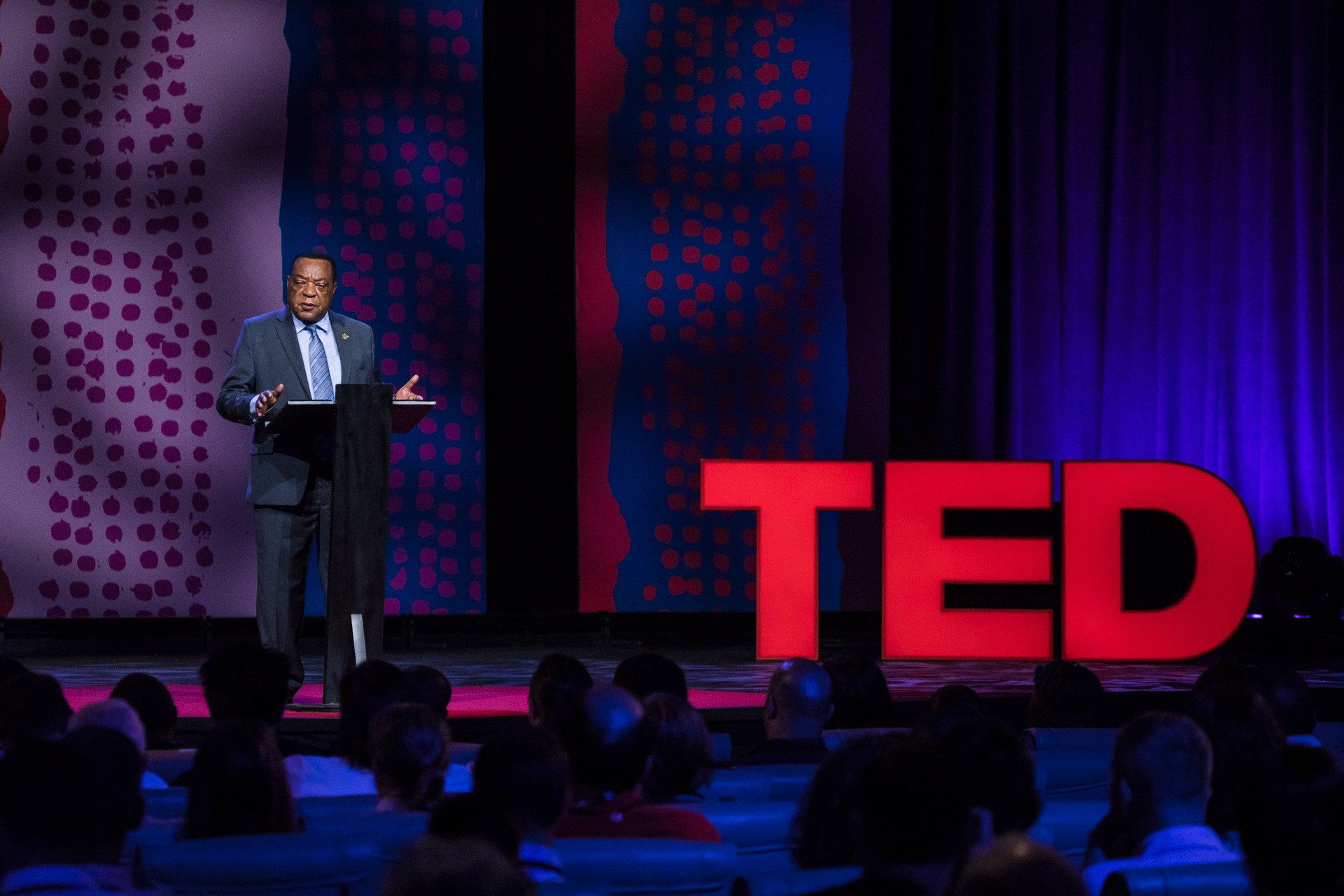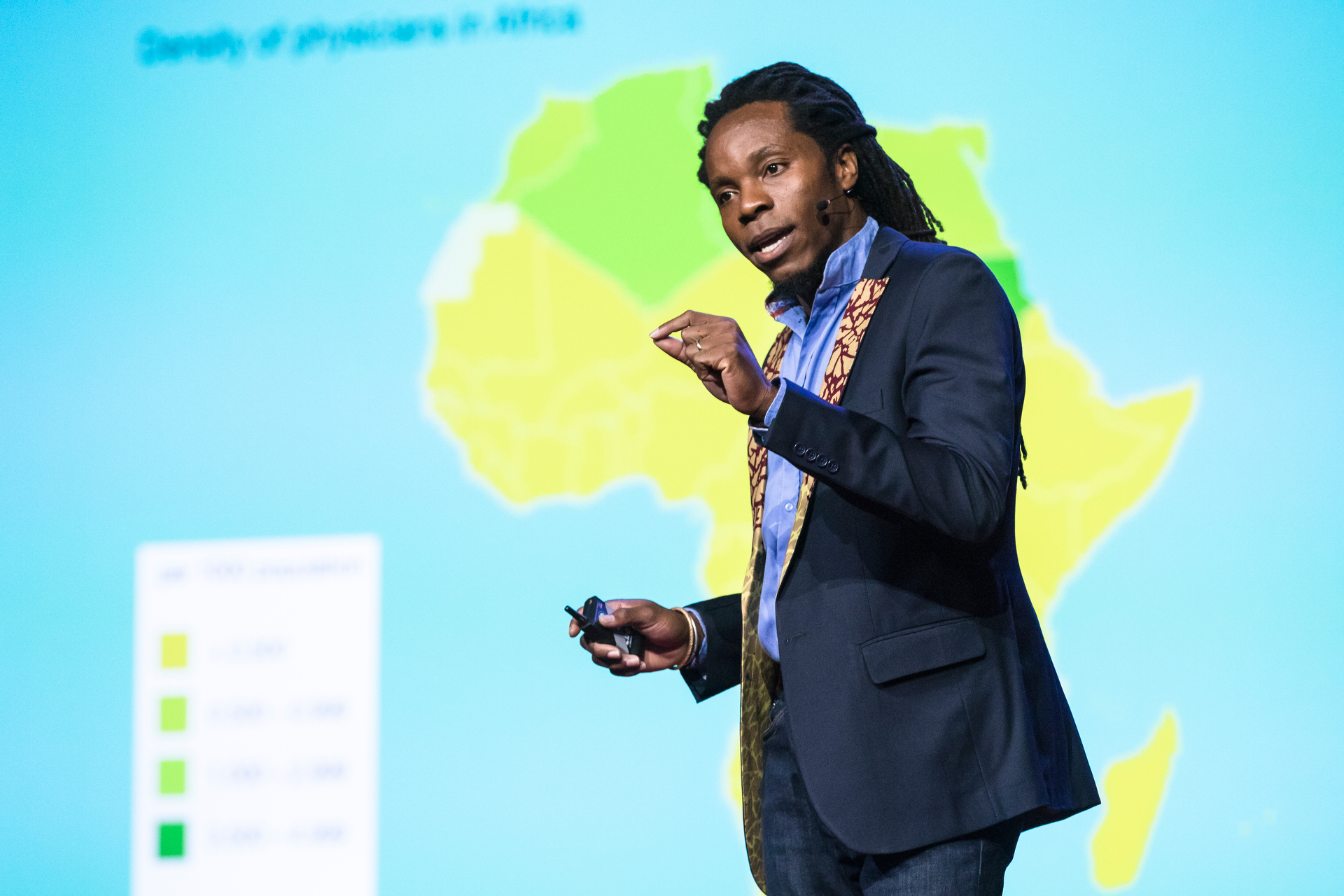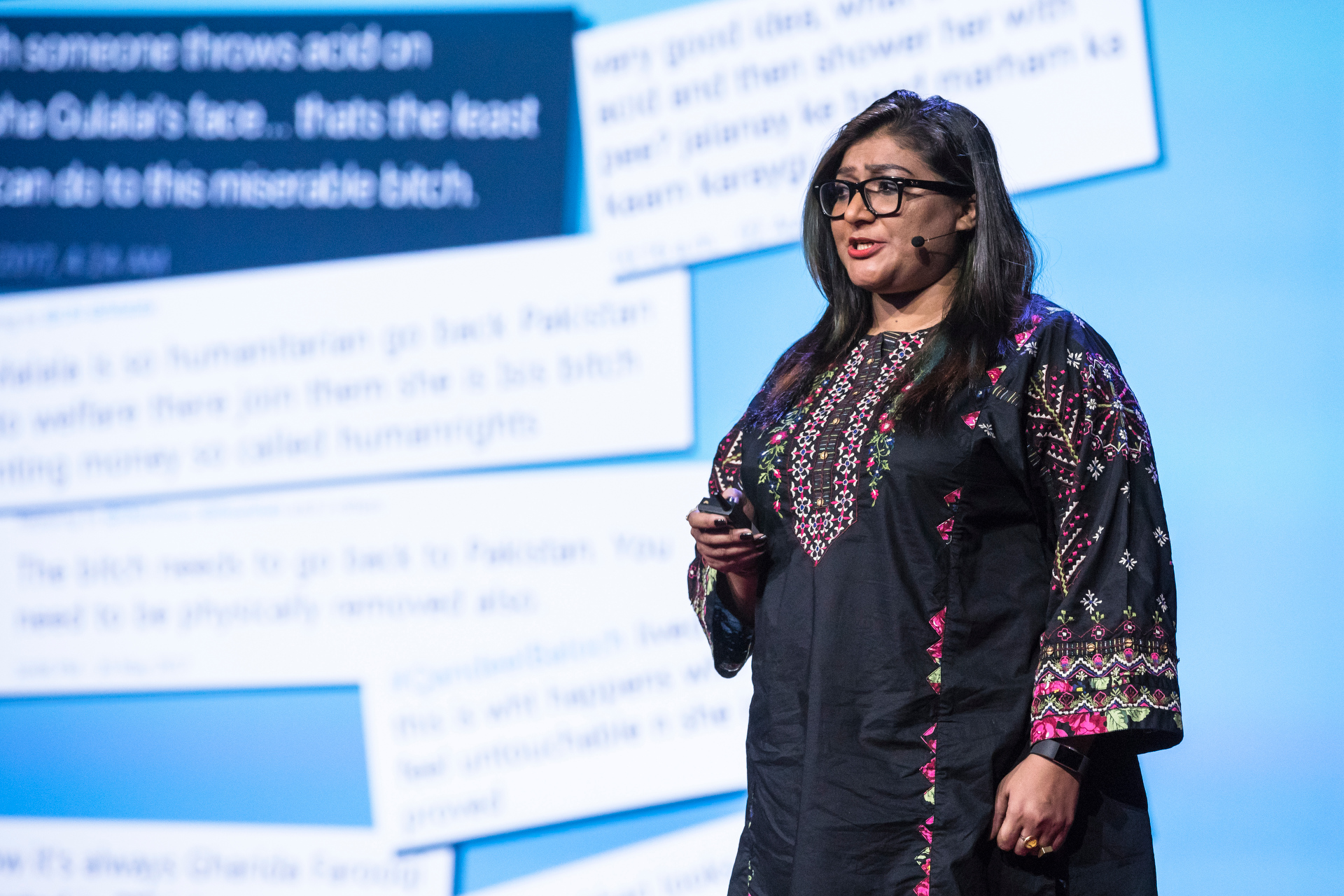
TED Fellow Mennat El Ghalid fights diseases in plants that cost billions in losses per year and threaten the security of the world food supply. Can we learn how diseases and plants communicate — and disrupt it? She speaks in Session 1 of the TED Fellows talks at TEDGlobal 2017, on Monday, August 28, 2017, in Arusha, Tanzania. Photo: Bret Hartman / TED
In this morning’s first session of short, sharp talks from the TED Fellows, an impressive lineup of world-changers share their ideas for seeing the world in new ways — like an AI that might help us see cancer symptoms, or a fresh view on how refugees really live, or a long-term study that’s detecting a social network for fish.
The morning kicks off with an address from the esteemed Minister for Culture of Tanzania, the Hon. Dr. Augustine Philip Mahiga, who spoke rather eloquently about the Tanzanian government’s determination to fight corruption, which distorts the economy and denies ordinary people the opportunity to better their own lives. He calls on the international community to support committed and courageous leadership in Africa that will root corruption out.

Among the root causes of corruption in Africa is the political and economic marginalization of sections of the population, suggests the Hon. Dr. Augustine Philip Mahiga, Minister of Foreign Affairs of Tanzania. He asks for leaders across Africa, and the international community, to support efforts to fight it. Dr. Mahiga speaks at TEDGlobal 2017 on Monday, August 28, 2017, in Arusha, Tanzania. Photo: Bret Hartman / TED
Next, we watch a video about TED Fellow Andrew Bastawrous’ work as an eye surgeon, taking eye care to remote parts of Kenya where people are least likely to get the care they need to treat preventable optical conditions.
For the first musical performance of the conference, we’re treated to the voice of Meklit Hadero, singing to the beat of Kasiva Mutua’s drums and accompanied by Joshua Roman’s cello to produce a soothing, soulful sound that I would later learn is called Ethio Jazz, a genre created by Ethiopian maestro Mulatu Astatke. A perfect sound for 9am in the morning.
Fun fact: Meklit met producer Dan Wilson at TED in 2013, and Wilson (who has worked with Adele, Nas, Pink and more) would eventually produce her new album, just dropped in June, called When the People Move, the Music Moves Too.
TED Senior Fellow David Sengeh is known for his work creating prosthetics in Sierra Leone. But in this talk, he points to a more endemic problem: Africa’s lack of doctors for its populations. As he points out, “A majority of African countries still have fewer than 50 doctors for every hundred thousand citizens, and for a rapidly growing population, this is not just problematic, but catastrophic.” Worse still is the lack of specialists — doctors who focus on cancer, respiratory ailments and more. His team at IBM Research Africa are developing AI tools that can mine biological data to predict the onset of disease. AI software that has been trained with a database of cervix images, for instance, can detect if cancer exists from color changes far more consistently than trained health professionals.
The objective, he takes care to say, is not to replace caregivers, but rather to augment their ability to diagnose and screen by automating tasks that are simple but eventually overwhelming for overstretched caregivers. “If we learn to leverage what AI being developed in Africa offers the continent, our young and growing population will be healthier and wealthier,” he says, “ready to transform our lives and ultimately lead the world.”

David Sengeh, a TED Senior Fellow, is working with a team at IBM Research Africa to develop AI tools that can mine biological data to predict the onset of disease — potentially bringing advanced diagnostic tools to even the most remote doctors and clinics. Photo: Ryan Lash / TED
“The Philippines. An idyllic country with some of the clearest water and bluest skies on the planet. It is also the epicenter of one of the fastest-growing HIV epidemics in the world.” Edsel Salvana warns of a ballooning epidemic in his home country of the ever-mutating HIV virus.
New subtypes of HIV are discovered regularly. Case in point, the aggressive Asian subtype AE that is plaguing the Philippines. If nothing is done, new subtypes might eventually make their way to other countries. Unfortunately, “mostly everything we know and do to treat HIV is based on studies on subtype B, even though it only accounts for 12% of cases of HIV in the world.”
Disease history provides lessons that we should pay attention to. Edsel cites the case of malaria, which had been put under control in the 1960s, but resurged in the 1970s because governments and agencies thought they had won and became complacent. He warns that this same form of hubris may foreshadow a global resurgence of HIV.
What can be done? Well, first, step away from the mindset that HIV is over, and commit anew to global plans to eradicate it. “We need to convince our governments and funding agencies that HIV is not yet done. We need to be vigilant and follow through.”
Adong Judith creates provocative theater and film, with storylines that create conversations that move disagreeing parties to the table. As an example, her play Silent Voices based on interviews with war crimes victims of the Northern Uganda war between the government and Joseph Kony’s Lord’s Resistance Army, brought together victims, political leaders, religious leaders, cultural leaders, Amnesty Commission and transitional justice leaders for talks that, she believes, transformed them.
“I know listening to one another will not magically solve all problems,” she says. “But it will give a chance to create avenues to start to work together to solve many of humanity’s problems.”
Mike Gil spies on fish. (It’s a living.) He and his colleagues set up video cameras to remote-monitor feeding grounds, to watch ocean fish eat algae that grow on coral reefs. It’s an intricate ecosystem: the corals need fish to eat the algae or else it overwhelms the reef, but the fish attract predators while they feed, which is always a worry if you’re a fish. By watching the fishes’ behavior over time, Gil and his colleagues made an interesting discovery: There’s a network effect at play. When a few fish came to eat, it signaled that the coast was clear of predators, and this would attract more fish. Conversely, this copying mechanism is how they would all know to beat it when a predator showed up. Think of it as a social network for fish. As he puts it, “fish social networks allow the actions of one to spread to many and could affect entire coral reefs, which feed millions of us and support the global economy of all of us.”
So what does all of this have to do with humans? Well, humans eat fish. Overfishing breaks up this social network and affects the delicate ecology of the reef, which would eventually be bad for humans who need to eat fish eventually. By sharing his findings from studying fish behaviour, Mike is urging us to think of sustainable ways to manage this resource if we want it to continue to exist.
Nighat Dad studies online harassment, especially as it relates to patriarchal cultures, including that of her small village in Pakistan, “where a woman is expected to stay at home,” as she says. Far from offering a digital window into a world of freedom, the internet and mobile phones can often be used to reinforce that same systematic misogyny. That’s why, in 2012, she founded the Digital Rights Foundation in Pakistan, and set up Pakistan’s first cyber harassment helpline in 2016. “Knowledge is freedom. When I fight for a woman’s digital rights, I am fighting for equality.”
What’s her ultimate goal? “Convincing young women that access to a safe, harassment-free internet is their basic human right.”

Nighat Dad launched Pakistan’s first cyber-harassment hotline in 2016, with the goal of creating more freedom for everyone online, even in cultures where misogyny is endemic IRL. Photo: Ryan Lash / TED
Pratik Shah is developing new lightweight ways to analyze medical images and other clinical data using AI — to create better diagnoses in all kinds of settings, from the fanciest hospital to the most remote clinic. The problem with traditional AI approaches is, they require thousands of images from MRIs and CT scanners to develop an algorithm. Shah’s group at the MIT Media Lab is working on a system that reduces that “thousands” to a much lower number — say, 50. It’s an unorthodox approach that could bring AI-assisted diagnosis to many more people worldwide.
Fungal diseases can devastate a plant crop. In the last century, the economically important American chestnut was nearly wiped out by chestnut blight; today, globally vital food crops suffer losses estimated in the billions of dollars per year due to fungal infections. Mennat El Ghalid and team have been looking deeply at one fungus, Fusarium oxysporum, that has a taste for tomato plants, to understand the way the plant and fungus communicate. Her work could, potentially, not only disrupt that communication but use it as a springboard for novel antifungal treatments that will eventually lead to larger crop yields and enhanced food security around the world.
Video break! An excerpt from the official video of Atie, by Blinky Bill, Kasiva Mutua, MITYA, and featuring the … extraordinary league of supergrans? Okay!
This took us to Carl Joshua Ncube, the “biggest Zimbabwean stand-up comedian in the world.” In fact, he says, “stand-up comedy has taken me, a Zimbabwean, to 37 cities around the world. 36 of those cities are in Zimbabwe.” He slings a set of pointed jokes about life under a 94-year-old perpetual president, calling out the ever-present fear and uncertainty that shows itself even in children’s names and cooking shows and the first billboard you see on the way from the airport. “I’m afraid of Robert Mugabe. He has been president for 37 years. I’m 38.” For his safety, and probably ours, we won’t be sharing the rest of his jokes. But we can tell you that he does a terrific Jamie Oliver impression.

Carl Joshua Ncube jokes (gingerly) about the absurdities of life under Zimbabwe’s 94-year-old perpetual president, Robert Mugabe. “He has been president for 37 years. I’m 38.” Photo: Bret Hartman / TED
If you live in Alaska, hearing is incredibly important. Hearing loss makes it difficult to fish on open water or hunt caribou. Half of all hearing loss may be preventable, says the WHO, but as Susan Emmett notes, the initial diagnosis can be a challenge. A traditional screening for hearing loss requires a soundproof room and a lot of expensive gear, which is not a practical option for people without access to hearing specialists. Emmet is pioneering a telemedicine system that uses a test developed in South Africa to screen hearing over the phone. She’s now launching a randomized trial in Alaska to see how well the intervention works. “Our goal is to prevent childhood hearing loss across the state of Alaska.”
Christian Rodriguez is a photographer and filmmaker — and the son of a teenage mother. For the past five years, he has documented the lives of teenage mothers in Latin America, starting in his home country, Uruguay. As he says: “I began exploring this theme to better understand myself and my origins.” The circumstances that lead very young women to become mothers are rarely happy ones, and his hope is to help break these cycles. Education plays a huge deal in breaking the cycle of teenage pregnancy. With a huge emphasis on boys, whom “we must stop teaching to be macho men.”
Did you know that most refugees live in cities? Though the world’s prevailing image is of massive, temporary refugee camps, Robert Hakiza says that more than 60% of refugees worldwide end up in urban areas, where they have better access to work and thus eventually to self-sufficiency. But they face many challenges. Because of their status, refugees mostly find themselves without access to education or health and exposed to harassment, intimidation and discrimination.
Forced to flee his country, the Democratic Republic of Congo, to Uganda because of war in 2008, Hakiza knows exactly how refugees feel. “We didn’t want handouts. We wanted to work and support ourselves. I joined my other two colleague exiles to set up an organization to help other refugees.”
Hakiza asks us to rethink the camp-building mentality: “Rather than wasting money on building walls, it would be better to spend on programmes to help refugees to help themselves.”
And to end an amazing session on a dancey note, the incredible, stylish, incomparable and ultra-cool Blinky Bill made the audience jump with a live electronic performance.
Another fun fact: Almost every single piece of music at the conference, from full-on performances to stage intros, was created by TED Fellows. An insanely talented group of people, these fellows. No pun.
Fellows Session two is happening in a few minutes, and we’re pumped! Stay tuned for updates from the rest of the conference.